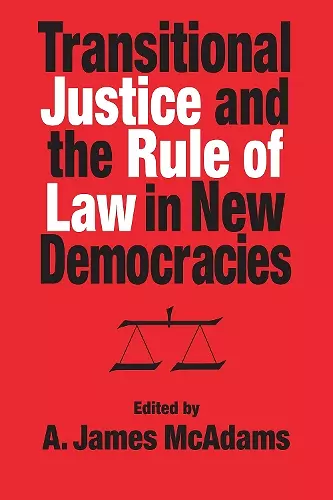Transitional Justice and the Rule of Law in New Democracies
Format:Paperback
Publisher:University of Notre Dame Press
Published:31st Mar '97
Currently unavailable, and unfortunately no date known when it will be back

This is the first focused study on the relationship between the use of national courts to pursue retrospective justice and the construction of viable democracies. Included in this interdisciplinary volume are fascinating, detailed essays on the experiences of eight countries: Argentina, Bolivia, Chile, Germany, Greece, Hungary, Poland, and South Africa. According to the contributors, the most important lesson for leaders of new democracies, who are wrestling with the human rights abuses of past dictatorships, is that they have many options.
Democratizing regimes are well-advised to be attentive to the significant political, ethical, and legal constraints that may limit their ability to achieve retribution for past wrongs. On prudential ground alone, some fledgling regimes will have no choice but to restrain their desire for punishment in the interest of political survival. However, it would be incorrect to think that all new democracies are therefore bereft of the political and legal resources needed to bring the perpetrators of egregious human rights violations to justice. In many instances, governments have overcome the obstacles before them and, by appealing to both national and international legal standards, have brought their former dictators to trial. When these judicial proceedings have been properly conducted and insulated from partisan political pressures, they have provided tangible evidence of the guiding principles-equality, fairness, and the rule of law-that are essential to the post-authoritarian order.
This collection shows that the quest for transitional justice has amounted to something more than merely a break with the past—it constitutes a formative act which directly affects the quality and credibility of democratic institutions.
"This exceptional collection of eight case studies succeeds by presenting an analysis based on primary source materials. . . . Political scientists, legal scholars, historians, comparativists, and human rights experts will profit from studying the successes and failures of eight fragile democracies that have tested varied responses to crimes against humanity. . . . Highly recommended." —Choice
"McAdams' book contains case studies from three countries in Latin America—Chile, Bolivia and Argentina—four from Europe (Hungary, Poland, East Germany and Greece) and South Africa. All of them are extremely interesting." —Democratization
"In their striving for legal objectivity, these essays are illuminating." —The Cambridge Quarterly
"Th[is] book offers a good testing ground for theory as applied to fact. It should serve as both a stimulating introduction for the novice and a valuable addition to the bookshelves of experts." —The American Journal of International Law
ISBN: 9780268042035
Dimensions: 229mm x 152mm x 18mm
Weight: 445g
332 pages